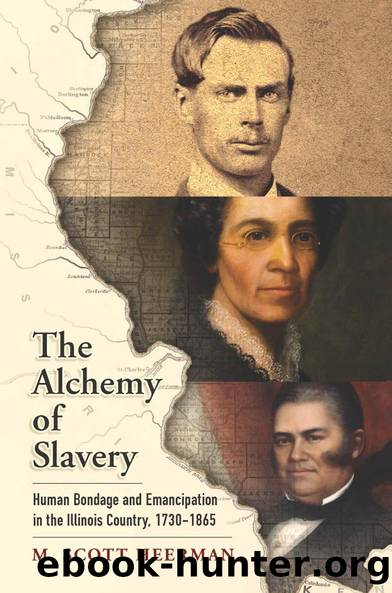The Alchemy of Slavery by M. Scott Heerman

Author:M. Scott Heerman [Heerman, M. Scott]
Language: eng
Format: epub
Tags: History, United States, 19th Century, Colonial Period (1600-1775)
ISBN: 9780812295337
Google: Ps9tDwAAQBAJ
Publisher: University of Pennsylvania Press
Published: 2018-09-10T03:33:26+00:00
With antislavery energy coursing out of freedom villages, the arc of abolition ran a different course in Illinois than in northern states along the eastern seaboard. African Americans in Boston, New York, Philadelphia, and Baltimore joined antislavery institutions and forged a politics of abolition that had traction in white reform-minded groups.125 These African Americans worked with manumission societies and made important contributions to those societiesâ work.126 They pioneered tactics that appealed to a broad constituency by chartering antislavery newspapers, authoring pamphlets and petitions, and conducting speaking tours.127 Additionally, African Americans adeptly used the law to protect their freedom.128 They frequently turned to courts, managing to enforce the various emancipation statutes on the books in their states. Across the northern United States, free African Americans were coworkers in the politics of abolition. Yet in Illinois, black activism against slavery came out of rural communities. Antislavery societies in Illinois were small and never had the same force as their counterparts in the East. Whatâs more, no gradual emancipation statute that freed all African Americans after a given date existed to help African Americans in their campaigns for emancipation. Instead, residents of Illinois black towns forged a set of resources and networks that supported enslaved men and women in their quests for freedom.
Life in black villages offered African Americansâfree, enslaved, and in degrees of unfreedomâan opportunity to build a life apart from the world that slaveholders made. Black migrants who settled in these towns empowered African Americans to express a capacious set of freedom practices: they served as beacons for runaway slaves from neighboring states as well as those running from within Illinois, they protected freed men and women from kidnapping and reenslavement, they built churches and other civic institutions, and they helped enslaved men and women sue in local Illinois courts for their freedom. These practices insulated African Americans from a world that equated blackness with bondage and freedom with a bundle of political rights, the franchise paramount among them. African Americans in eastern cities waged a robust campaign for full citizenship, and those movements in time helped to transform the nation. Yet the quest for full black citizenship was not the only measure of black freedom politics. Freed men and women in Illinois sought an alternative to slavery but did not necessarily embrace notions of freedom that were commonplace in antebellum America. If, as it has long been argued, human bondage in part defined freedom in the United States, these villages helped to make spaces where African Americans could separate themselves from the contaminated notions of liberty that pervaded the nation.
Notwithstanding their victories, emancipation in Illinois was a contested, fragile process. Racism only grew more virulent over time: emancipation bonds became costlier, and in time, the legislature banned all black migration to the state. Servants and slaves went through various stages of unfreedom before exiting bondage; the threat of kidnapping always loomed. Yet, in black towns, freed men and women managed to buy land and use the courts to protect it and other liberties, and in so doing, they built a life apart from slavery.
Download
This site does not store any files on its server. We only index and link to content provided by other sites. Please contact the content providers to delete copyright contents if any and email us, we'll remove relevant links or contents immediately.
| Americas | African Americans |
| Civil War | Colonial Period |
| Immigrants | Revolution & Founding |
| State & Local |
In Cold Blood by Truman Capote(3374)
The Innovators: How a Group of Hackers, Geniuses, and Geeks Created the Digital Revolution by Walter Isaacson(3143)
Steve Jobs by Walter Isaacson(2889)
All the President's Men by Carl Bernstein & Bob Woodward(2362)
Lonely Planet New York City by Lonely Planet(2215)
And the Band Played On by Randy Shilts(2197)
The Room Where It Happened by John Bolton;(2150)
The Poisoner's Handbook by Deborah Blum(2131)
The Innovators by Walter Isaacson(2096)
The Murder of Marilyn Monroe by Jay Margolis(2094)
Lincoln by David Herbert Donald(1981)
A Colony in a Nation by Chris Hayes(1926)
Being George Washington by Beck Glenn(1907)
Under the Banner of Heaven: A Story of Violent Faith by Jon Krakauer(1788)
Amelia Earhart by Doris L. Rich(1687)
The Unsettlers by Mark Sundeen(1682)
Dirt by Bill Buford(1669)
Birdmen by Lawrence Goldstone(1662)
Zeitoun by Dave Eggers(1643)
